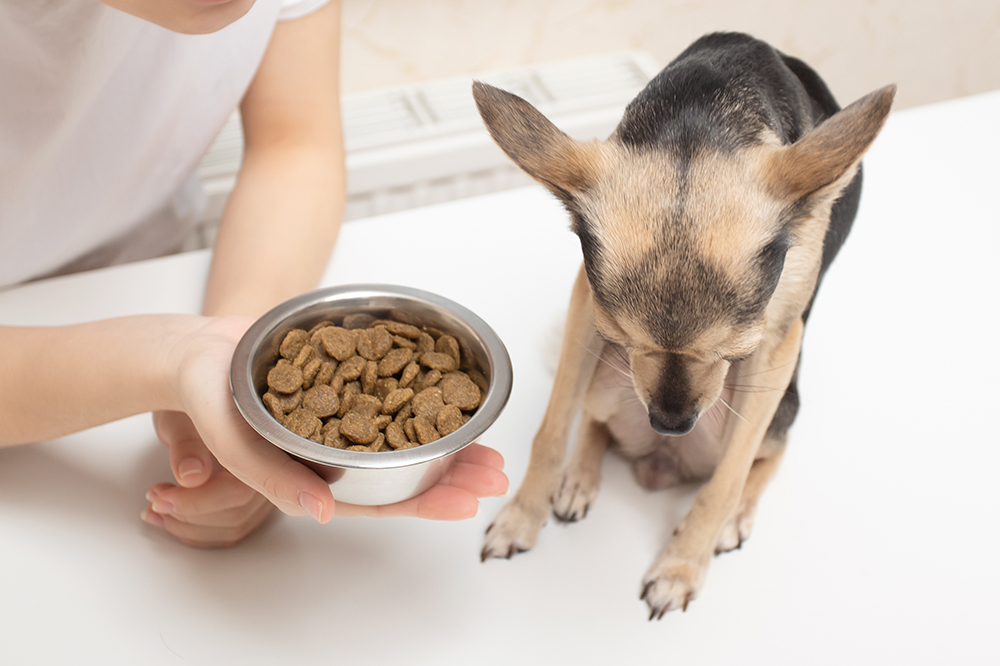Troubleshooting Why Your Dog Refuses to Eat
When you have a furry friend at home, it can be concerning when they suddenly refuse to eat. As a loving pet owner, you want to ensure your dog stays healthy and happy. In this comprehensive guide, we will delve into the common reasons why your dog may be experiencing a loss of appetite and provide troubleshooting tips to encourage them to eat again.
If you are unable to resolve the issue or have any concerns, don’t hesitate to book an appointment with Lane Veterinary in Hinsdale, IL, where our experienced team is ready to provide expert care for your beloved companion.

Understanding the Causes of Appetite Loss in Dog
Dental Issues
Just like humans, dogs can experience dental problems that make it difficult and painful for them to eat. Dental issues such as tooth decay, gum disease, or broken teeth can cause discomfort, leading to a loss of appetite. Keep an eye out for signs like excessive drooling, bad breath, or reluctance to chew on toys or bones.
Digestive Problems
Digestive disorders can also contribute to appetite loss in dogs. Conditions such as gastritis, pancreatitis, or inflammatory bowel disease can cause nausea, vomiting, and abdominal pain, making it unappealing for your dog to eat. If your dog shows signs of an upset stomach or has experienced recent changes in their bowel movements, it’s important to consult with a veterinarian to rule out any underlying health issues.
Behavioral Factors
Changes in your dog’s behavior and environment can have a significant impact on their appetite. Stress, anxiety, and depression can affect dogs just as they can affect humans. Major life changes, such as moving to a new home, the loss of a family member, or the addition of a new pet, can disrupt their eating routine. Additionally, certain medications or recent vaccinations may also cause a temporary loss of appetite.
Steps to Encourage Your Dog to Eat Again
Assessing the Food and Feeding Routine
The first step in troubleshooting your dog’s appetite loss is to assess their food and feeding routine. Ensure that you are offering them a well-balanced and nutritious diet that meets their specific dietary requirements. Check the expiration date on the food packaging and make sure it hasn’t gone bad. Additionally, consider the feeding schedule and portion sizes—dogs, like humans, may have preferences for specific feeding times and portion amounts.
Trying Different Food Options
If your dog has lost interest in their regular food, you can try adding some variety to their diet. Offer different flavors or textures of food, and consider incorporating healthy, dog-friendly human foods as treats. However, be cautious of potential allergens or foods that may be harmful to dogs. Consulting with a veterinarian can help you determine the best options for your dog’s nutritional needs.
Ensuring a Comfortable Environment
Create a calm and stress-free environment during mealtime. Avoid distractions such as loud noises or other pets that may disrupt their focus on eating. Establish a designated feeding area that is quiet and away from high traffic areas. Some dogs prefer privacy while eating, so consider providing a secluded space where they can enjoy their meals undisturbed.
When to Seek Professional Help
Persistent Refusal to Eat
If your dog consistently refuses to eat for more than 24 to 48 hours, it is essential to seek professional help. Prolonged appetite loss can lead to malnutrition and other health complications. A veterinarian can conduct a thorough examination to identify any underlying medical conditions that may be causing the decreased appetite and recommend appropriate treatment options.
Noticeable Weight Loss
If you notice your dog losing weight or becoming visibly thinner, it is a cause for concern. Weight loss is a potential sign of underlying health issues or malnutrition. Your veterinarian can assess your dog’s overall health and determine the best course of action to help them regain a healthy weight.
Other Concerning Symptoms
Keep an eye out for other accompanying symptoms that may indicate a more serious underlying problem. These symptoms may include lethargy, diarrhea, vomiting, excessive thirst, or changes in urination patterns. If you observe any of these symptoms, it is crucial to consult with a veterinarian promptly to ensure the well-being of your dog.
Trust Lane Veterinary for Expert Care and Support
If your dog’s appetite loss persists or if you have any concerns about their health, it’s important to reach out to a professional veterinary team. At Lane Veterinary in Hinsdale, IL, we specialize in providing exceptional care for your beloved pets. Our experienced veterinarians will conduct a comprehensive examination, diagnose the underlying cause of appetite loss, and develop an appropriate treatment plan to get your furry friend back on track. Don’t wait until it’s too late—book an appointment with Lane Veterinary today and let us help your dog regain their healthy appetite and overall well-being.
In conclusion, a loss of appetite in dogs can stem from various factors, including dental issues, digestive problems, and behavioral factors. By assessing the food and feeding routine, trying different food options, and creating a comfortable environment, you can encourage your dog to eat again. However, if your dog’s appetite loss persists or is accompanied by weight loss or concerning symptoms, it’s crucial to seek professional help. Trust Lane Veterinary in Hinsdale, IL, to provide expert care and support for your furry companion. Book an appointment today and ensure your dog’s health and happiness.
Recent Posts
About Us
Choosing a vet means entrusting your pet’s care and well-being to capable hands. Lane Veterinary strives to be a lifetime vet for you and your family, being the people you can always lean on for support and guidance. As a privately owned practice, we stand to give people and their pets the one-on-one care and attention they deserve in a calm and comfortable setting.
